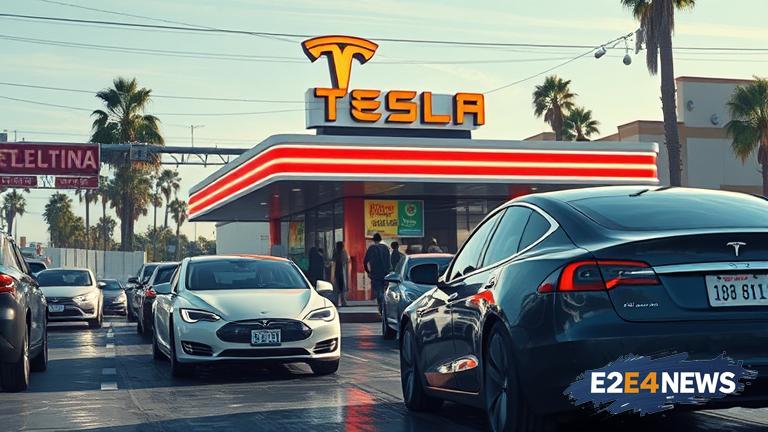A recently opened Tesla diner in Los Angeles, California, has become a source of contention among local residents, who are frustrated with the increased traffic congestion in the area. The diner, which is located in a busy part of the city, has attracted a large number of customers, resulting in long lines of cars and gridlocked streets. Residents have taken to the streets to protest the situation, holding signs and chanting slogans to express their discontent. The protesters are demanding that Tesla CEO Elon Musk take immediate action to mitigate the traffic problems caused by the diner. Musk has been criticized for his handling of the situation, with many accusing him of prioritizing profits over the well-being of the community. The controversy has sparked a heated debate about the impact of technology and innovation on urban planning and traffic management. While some argue that the Tesla diner is a welcome addition to the city’s culinary scene, others claim that it is a prime example of how unchecked development can lead to chaos and disruption. The Los Angeles City Council has announced plans to review the diner’s permit and consider measures to alleviate the traffic congestion. In the meantime, residents are calling for a boycott of the diner and urging others to join them in their protest. The situation has also raised questions about the role of social media in amplifying community concerns and mobilizing public opinion. As the protest continues to gain momentum, it remains to be seen how Tesla and the city will respond to the demands of the residents. The incident has highlighted the need for more effective urban planning and traffic management strategies, particularly in areas with high population density. Furthermore, it has sparked a wider conversation about the responsibilities of corporations and their impact on local communities. The Tesla diner controversy has also drawn attention to the importance of community engagement and participation in the decision-making process. In addition, it has raised concerns about the potential consequences of unchecked gentrification and the displacement of long-time residents. As the situation continues to unfold, it is likely that the Tesla diner will become a test case for how cities balance economic development with community needs and concerns. The incident has also highlighted the need for more sustainable and environmentally friendly transportation options, particularly in urban areas. Moreover, it has sparked a debate about the role of technology in shaping urban landscapes and the need for more inclusive and equitable planning practices. The controversy surrounding the Tesla diner has also drawn attention to the importance of preserving community character and protecting the rights of local residents. In conclusion, the Tesla diner debacle has become a lightning rod for community concerns and a catalyst for a wider conversation about the future of urban development and traffic management. The situation is a reminder that even the most innovative and forward-thinking companies must prioritize community needs and concerns in their decision-making processes. As the city and Tesla work to address the traffic congestion and other issues related to the diner, it is likely that the controversy will continue to be a major topic of discussion and debate in the coming weeks and months.
